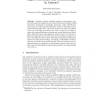Free Online Productivity Tools
i2Speak
i2Symbol
i2OCR
iTex2Img
iWeb2Print
iWeb2Shot
i2Type
iPdf2Split
iPdf2Merge
i2Bopomofo
i2Arabic
i2Style
i2Image
i2PDF
iLatex2Rtf
Sci2ools
WSPI
2004
2004
Logic, Neuroscience and Phenomenology in Cahoots?
Cognitive sciences, including cognitive neurosciences, have provided important insights into the notions of awareness, implicit/explicit information processing in knowledge, perception, object identification and memory, as well as general information retrieval. Meanwhile, propositional-attitude logics have coped with awareness in terms of symbolic tools, but are lacking the pathways by which to relate the two fields. I argue that empirical findings concerning rare neural dysfunctions (blindsight, unilateral neglect, prosopagnosia, implicit memory) contribute to logical investigations. On the other hand, the early phase on cognitive science, the origins of which coincide with that of pragmaticist philosophy, shared roots with phenomenology. Accordingly, I will identify strands in that early period that have surfaced in logic, AI and computer science. In phenomenology, the significance of the division between implicit and explicit aspects of knowledge in understanding cognition was ackno...
Cognitive Science | Implicit/explicit Information Processing | Rare Neural Dysfunctions | WSPI 2004 | WSPI 2008 |
| Added | 31 Oct 2010 |
| Updated | 31 Oct 2010 |
| Type | Conference |
| Year | 2004 |
| Where | WSPI |
| Authors | Ahti-Veikko Pietarinen |
Comments (0)

